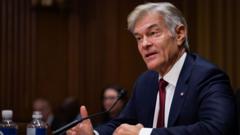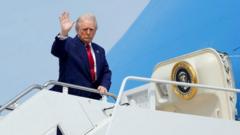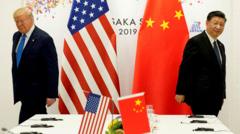The European Union is grappling with increased tariffs from the U.S. under President Trump, pushing it to reconsider its trade dynamics, particularly with China. This situation could foster closer ties or exacerbate existing tensions depending on how each side reacts to the shifting trade landscape.
EU's Trade Dilemma: Balancing Tariffs and Relationships with China Amidst US Policies

EU's Trade Dilemma: Balancing Tariffs and Relationships with China Amidst US Policies
As the European Union faces significant tariffs from the U.S., its trade options are shifting, presenting both opportunities and challenges in its relationship with China.
As trade tensions rise between the U.S. and the European Union (E.U.), prompted by President Trump's sweeping tariffs, the E.U. finds itself at a crossroads, exploring new partnerships and recalibrating its relationship with China. The E.U., which ranks behind the U.S. as the second-largest consumer market globally, is now contending with significant tariffs potentially threatening access to American markets.
The chilling effect of a potential 20 percent hike in tariffs on varied products, including automobiles, has spurred European companies to consider China, the third largest consumer market. Despite a history of friction characterized by criticisms of Chinese market practices and political alignments, particularly relating to the Ukraine conflict, the E.U. may be compelled to enter negotiations with China.
Earlier this year, the E.U. imposed raised tariffs on Chinese electric vehicles. However, amidst these tensions, there appears to be a thawing as indicated by China’s commerce ministry's announcement of resumed negotiations with E.U. officials on electric vehicle supply chains and pricing.
Yet, the risk exists that China, facing reduced consumer access in the U.S. due to tariffs exceeding 50 percent, might pivot even further towards the E.U. for market opportunities. This could lead to an influx of inexpensive commodities from China, intensifying existing concerns over market dumping and potentially straining E.U.-China relations anew.
Experts warn that Europe is navigating a precarious situation. Theresa Fallon, an analyst with the Center for Russia, Europe, Asia Studies in Brussels, suggests, “There are two ways this could play out,” reflecting the uncertainty that looms over European negotiation strategy. As the global trade landscape continues to shift, the E.U. must balance revenue opportunities and long-term economic impacts while carefully assessing its trade relations with both the U.S. and China.






















